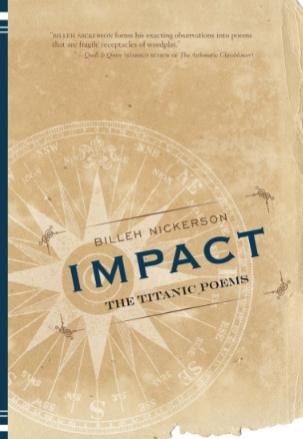As of press time, there were somewhere in the region of 14 billion commemorative gestures aimed at the 100th anniversary of the Titanic’s sinking. Some might be considered crass and exploitative, like the gold-plated centenary coins available online. Others, like the Titanic Memorial Cruise, might be charitably described as completely fucked. Others still feature Leonardo DiCaprio in three dimensions.
But few are as worthwhile as Impact: The Titanic Poems, a collection by Vancouver poet Billeh Nickerson so well-imagined it borders on clairvoyant. Full disclosure: Nickerson is a contributor to Xtra and has been for years. But we like his poems because they’re good – often damn good – and because they breathe new life into a cottage industry that long ago died a Malthusian death. That he’s written columns for Xtra on subjects ranging from catering to anal bleaching is completely beside the point.
Impact, Nickerson’s third collection, is a series of “poetic snapshots” that starts with the Titanic’s construction in Belfast and ends with a modern-day look at the Fairview Cemetery in Halifax, the author’s hometown, where more than 100 victims of the ship’s sinking are buried and where “young girls/leave panties and love notes/for the crewman with a name similar/to the character played by DiCaprio.” It’s a structure that lends narrative heft to the 55 delicate arrangements within, and which Nickerson says is designed to “slow down the expectation” of the collection’s foregone climax.
The poems themselves are poignant and evocative, and better researched than most theses. Nickerson, who sunlights teaching creative writing at Kwantlen University in Vancouver, wrote the poems over a 15-year period that included visits to Belfast and Halifax. Xtra chatted with him three days before Impact’s April 15 publication about process, Can-con and James Cameron.
Xtra: When did you first become interested in the Titanic?
Billeh Nickerson: I’ve been interested in the Titanic since I was eight or nine years old. I’d say the pivotal moment happened when my grandmother mentioned that Halifax, my hometown, had graveyards with Titanic casualties. I remember being stunned that Canada had any connection to the ship.
What explains our enduring fascination with the Titanic’s story?
It really is timeless. Between the class issues and the technology and the decadence and the tragedy, the story has it all. It’s a multilayered affair, and that always makes for good storytelling. It resonates just as well today as it did 100 years ago.
How much of Impact is fact and how much is fiction?
While the collection has a few speculations – including the title poem, where I have a small child on deck when it was probably too late for a child to be out there – much of it stems from historical research and facts. I like to think of it as inspiration. My goal is often to capture a particular emotion or conundrum or state of mind.
There’s a fair amount of Can-con in Impact. Was that deliberate or just a symptom of the story’s geography?
In many ways, Halifax was a starting point for me. There wouldn’t have been a book had I not been intrigued by its overlooked stories. I think it’s important for folks to know that the Mayflower Curling Club was used as a morgue for the Titanic casualties, and that Halifax-based sailors carved rolling pins out of the wreck-wood retrieved from the sea.
You’re not the only one marking the Titanic’s 100th anniversary. Is James Cameron stealing your thunder?
There’s room for all of us. If anyone is stealing my thunder, it’s Céline Dion.
The Deets:
Impact: The Titanic Poems
Billeh Nickerson
Arsenal Pulp Press
$14.95


 Why you can trust Xtra
Why you can trust Xtra


